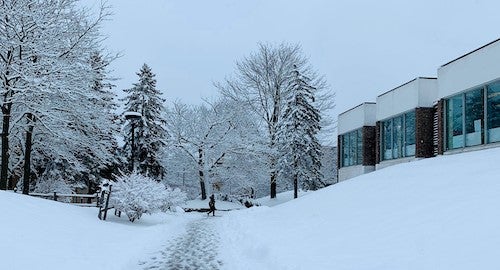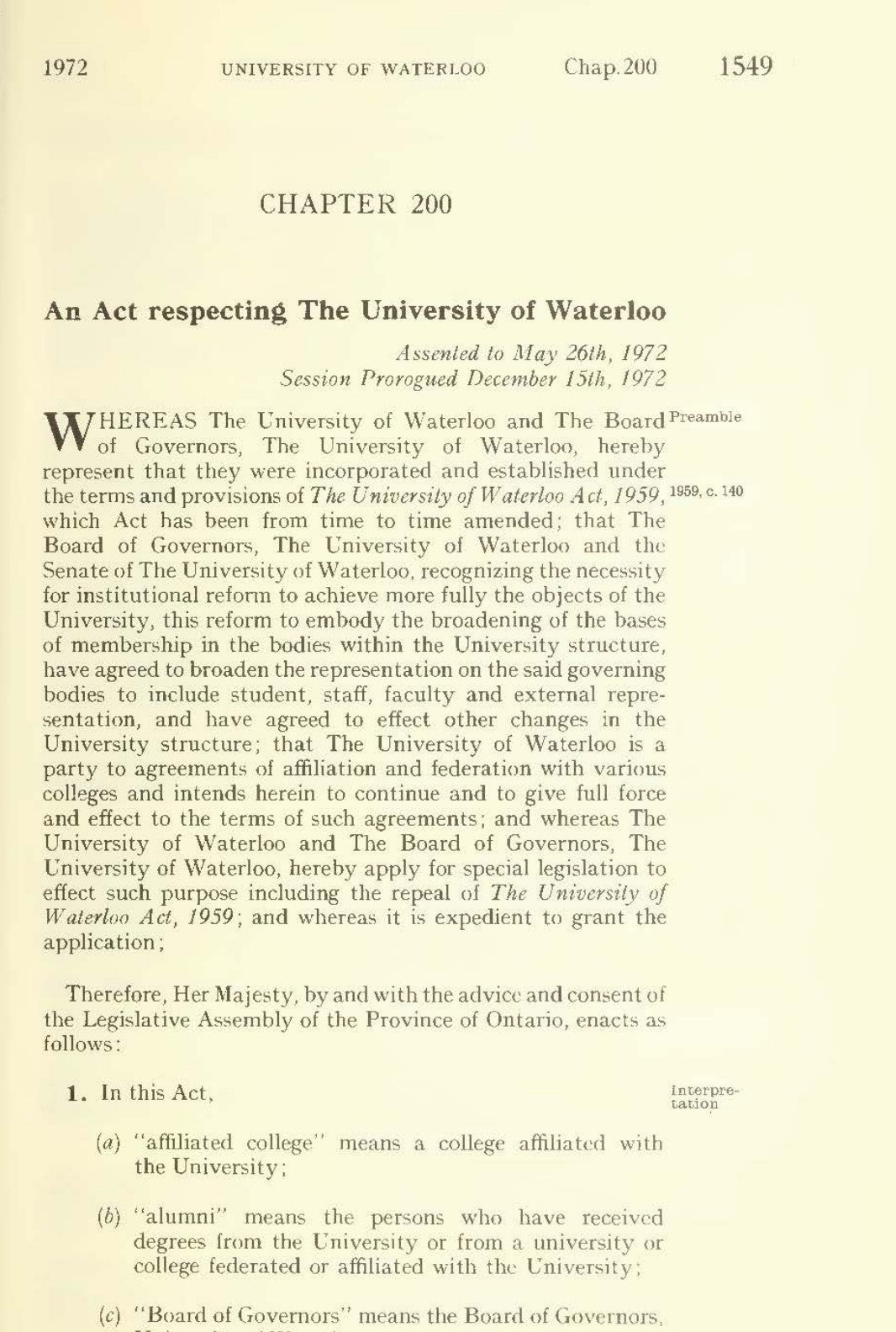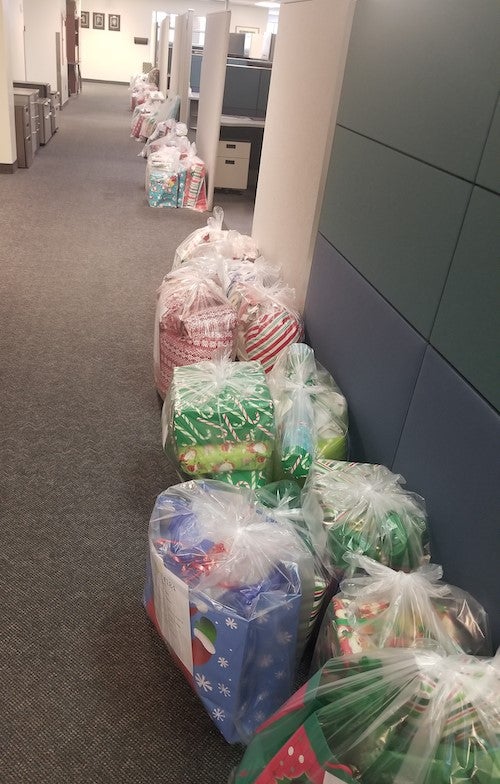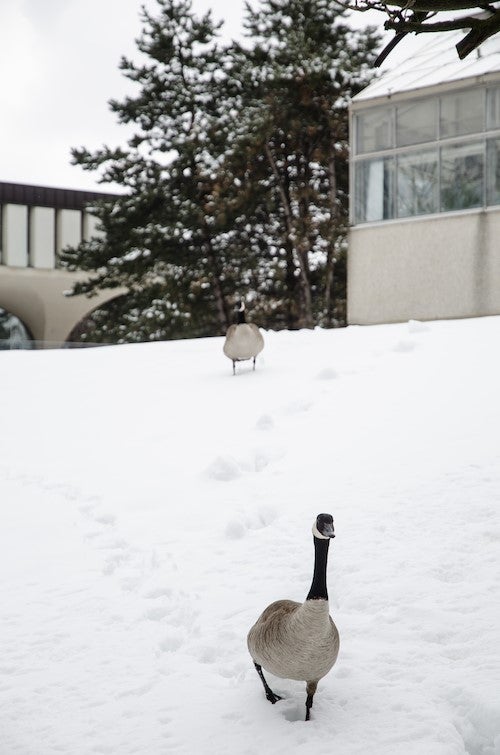Editor:
Brandon Sweet
University Communications
bulletin@uwaterloo.ca
Christmas comes early for campus with a closure

Maurice Green took this photo of the Dana Porter Library's festive reflection in a slush puddle way back in December 1972. The photo appeared in the Gazette, the University of Waterloo's official newspaper.
Call it Snowmaggedon or Snowpocalypse '22. Whatever you call it, campus has closed a day early and thus not a creature is stirring as the snow continues to fall, sometimes sideways. The University's physical campuses are closed today as much of the province prepares to deal with a significant winter storm that has so far produced rain, plummeting temperatures, sustained winds and snow. It's not over yet.
The rare pre-emptive closing decision was gift-wrapped yesterday by the Vice-President, Academic & Provost based on advice from the Associate Vice-President, Communications, the Director of Special Constable Services, and the Executive Director of Plant Operations. Administrators from satellite campuses also weighed in.
"Conditions are set to be uncertain and potentially dangerous," says the memo from Provost Rush circulated to all campus audiences yesterday. "As we have no scheduled academic activity on Friday, we are closing our campus locations."
"Only those people who provide essential services should come to campus locations," the provost writes. "We will continue to provide support for students who remain on our campus over the winter break. Conditions on campuses may be slippery on Friday and over the closure period. Please take caution when moving around."
"Employees who are scheduled to work on Friday and that can work remotely should plan to do so," the provost's memo continues. "If you have any questions about whether you should be working, please contact your supervisor."
As per the University's Weather Closing Guidelines, "closed" means: classes are not held; meetings and other scheduled events are cancelled; scheduled examinations are cancelled, to be rescheduled; deadlines for assignments and other submissions are postponed until the same hour on the next business day on which UW is not "closed"; staff, other than those providing "essential services" are not expected to be at work, but are paid for a normal day."
Additionally, "essential services" are defined to include "food service in the residences; policing; the central plant; residence life staff; snow removal; emergency repair and maintenance; animal care. Staff providing "essential services" will be so designated by their Department Heads, who are responsible for assigning duties to be carred out and making reasonable arrangements for the protection of such staff."
The provost's full statement has been posted on the University's weather page and on the Employee Communications website.
The one bit of coal in the stocking? Employees who had previously scheduled a vacation day today are not entitled to equivalent time off later.
The School of Architecture, the School of Pharmacy, and the Stratford School of Interaction Design and Business have followed the main campus's early shutdown.
Normally, Central Stores would provide normal delivery/pickup services for all departments on the last working day, but with today's closure there will be no pickup and delivery activity.
Library locations will be closed today though the Chat With Us and email channels may remain available from 10:00 a.m. to 4:00 p.m. and 8:00 a.m. to 5:00 p.m respectively.
Thankfully, there are no exams scheduled for today, so this closure should have minimal effect on students, though some medical appointments at Campus Wellness will have to be rescheduled.
If you're feeling brave about venturing into the blizzard to do some last-minute Christmas shopping, take heart in knowing that today is payday for employees on the monthly payroll. Employees paid bi-weekly received their paycheques on December 20.
Speaking of roads, Plant Operations notes that the snow-clearing priority will be for emergency routes and roadways, as well as the L Parking Lot for essential workers on Saturday and Sunday. On Monday, crews will return to campus to continue clearing emergency routes and roads as well as the remaining parking lots.
Campus Wellness will be closed from Friday, December 23 to Monday, January 2, 2023. During the break, Campus Wellness phones and emails will not be monitored and documents will not be processed.
Print + Retail Solutions operations including W Store SCH, W Store Essentials, and W Print SCH are closed today. For the latest hours of operation, please visit the Locations + Hours page. Any orders placed after December 20 will begin to be processed on January 3, 2023. “You will receive notification by email when your order is ready for pickup or has shipped,” says a note from Print + Retail Solutions.
Campus Housing began shutting down its amenities including front desks and residence eateries by 11:59 p.m. last night due to the storm and closure announcement, but those few students who are still in residence will be able to stay until it is safe to leave. Students participating in the December International Student Stay Program were moved to Columbia Lake Village a day early.
Special Constable Services began locking up campus buildings after the final exam of the examination period at 6:30 p.m. yesterday. Buildings with electronic locks will be similarly shuttered. Director of Special Constable Services Alan Binns would like to remind the campus community that all buildings will be locked during the holiday break.
The Safety Office already sent out its December Holiday Laboratory Shutdown Memo to faculty health and safety coordinators for distribution to all lab users last week. Due to winter weather conditions, utilities (especially electricity) may be affected. It is a general rule that all laboratory processes be designed to safely survive a service failure. Please review the memo for more information and contact the Safety Office with any questions.
In the event that you have a lab incident, the Safety Office asks that you report failures of equipment or physical plant to Plant Operations at x33793. Contact the Safety Office or UW Spill Team through Special Constable Services at 519-888-4911 or x22222 if you have concerns relating to hazardous materials spills.
"This is just a reminder that if you are leaving your office/residence unattended over the holiday season, take your valuables with you and ensure that all doors and windows are locked and secured prior to leaving for the break," says a note from Special Constable Services. "The University of Waterloo Special Constable Service will continue patrols of the campus over the holiday shutdown period and can be contacted at phone number (519) 888-4911 or email address uw-special-constable-service@uwaterloo.ca."
Remember folks: every time the University of Waterloo closes, an angel gets its wings.
There's snow place like home for the holidays

So, campus has settled in for an extra-long winter's nap a day earlier than usual. What does that mean, exactly?
Waterloo's campuses will be closed down from Friday, December 23 to Monday, January 2, 2023, with operations resuming on Tuesday, January 3, 2023. The co-op term begins on Monday, January 9, 2023, with winter term classes and lectures also set to begin on Monday, January 9, 2023.
Until then, here's what's going on, or in most cases, what's not going on, while Plant Operations digs campus out from beneath its wintry blanket.
The ECEC children’s program closed on December 20 at 4:30 p.m. and will re-open on Tuesday, January 3, 2023 with regular hours.
All W Store and W Print locations will be closed over the holiday break from December 24 to January 3, 2023.
Information Systems & Technology Service desks in the Davis Centre, Dana Porter, and Village 1 will be closed from December 23 to January 2, 2023.
Velocity spaces on campus (including Velocity Digital, Velocity Science, and the Problem Lab) will be closed for the break, and the Tannery building will be closed to the public until January 2, 2023.
The Centre including WatCard (located within The Centre) will be closed for the holidays.
Food Services operations will be shuttered over the break.
The School of Architecture's Melville Café will be closed Saturday and Sunday, open December 28 from 9:00 a.m. to 3:00 p.m., December 29 from 9:00 a.m. to 3:00 p.m., December 30 from 9:00 a.m. to 3:00 p.m. and December 31 from 9:00 a.m. to 3:00 p.m. It will be closed on Sunday, January 1, 2023.
Library locations will remain closed until Tuesday, January 3, 2023, with the Chat With Us and email channels unavailable.
Snow removal on the main campus over the holiday period will be limited, according to Sharon Rumpel, Associate Director of Grounds, Parking and Transportation in Plant Operations. "Grounds staff will respond to serious snow issues," is the official word, especially to clear priority areas such as the ring road. Added Rumpel, “During the holiday break, grounds staff will be on call to do winter maintenance of emergency routes on campus as requested by either Special Constable Services or Central Plant.”
All parking lots will be open and free throughout the holidays, except for lot D under Needles Hall and the Early Childhood Education Centre (ECEC) lot at the Psychology, Anthropology, and Sociology (PAS) building. Gates to the lots around campus are raised and open.
Plant Operations requests that pedestrians and campus travellers observe the signs marked on trails around the campus stating that there is no winter maintenance and that all use is at their own risk.
A major exception to the campus shutdown is the Student Life Centre. Scott Pearson, Facility Operations and Membership Manager of the SLC, writes that the building will be open throughout the holiday season, as always. The Turnkey Desk (519-888-4434) “will be staffed 24 hour a day with friendly Turnkeys to provide assistance to those who stay on campus,” says Pearson. The exception to the exception, of course, is the Turnkey location in the Davis Centre, which will reopen on Monday, January 9, 2023.
"Only the Ring Road and Turnkey doors will be open during the holiday shutdown, however the building is open for Student use, all other entrances will be exit only.”
Most of the Student Life Centre's businesses will shut down entirely throughout the break including Lifetouch Photography, Tim Hortons, Brubakers, Flock Stop, Student Health Pharmacy and SOS Physiotherapy.
CIBC will be open on till 5:00 p.m. on December 23. The branch is open on December 28, 29 and 30 for regular hours (9:30 a.m. to 5:00 p.m.) The branch is closed on December 24, 25, 26, and 27. Regular hours will return on Tuesday, January 3, 2023.
GO Transit will continue to service campus throughout the shutdown. Full ticketing and travel information is online or available at the Turnkey Desk. GO Transit will operate on a Sunday schedule on December 25 and January 1, 2023 and a Saturday schedule on December 26, 27 and January 2, 2023.
Campus Housing reports that "to support our CLVN residents and the December International Student Stay Program, our CLV Front Desk will be open during the December break on the following days:."
- Tuesday, December 27 from 12:00 p.m. to 4:00 p.m.
- Wednesday, December 28 from 9:00 a.m. to 1:00 p.m.
- Thursday, December 29 from 12:00 p.m. to 4:00 p.m.
- Friday, December 30 from 9:00 a.m. to 1:00 p.m.
The Adaptive Technology Centre at Dana Porter Library will be closed from December 23to January 16, 2023 for repairs and a refresh. “During this time, the general space, the study rooms, and the assistive technology will be unavailable,” says a note from the Library. “If you have any questions or concerns, please contact the Library Accessibility Team via Ask Us.”
What to expect when 2023 arrives
With the winter term not kicking off until Monday, January 9, 2023, there will be a few more quiet days as employees return to campus in January for a short week that begins Tuesday, January 3, 2023.
The Centre plans to reopen Tuesday, January 3, 2023.
Print + Retail Solutions locations will resume regular hours on Tuesday, January 3, 2023.
Campus Wellness operations will open on Tuesday, January 3, 2023.
IST Service Desks across campus will reopen on Tuesday, January 3, 2023.
Library locations will be open beginning Tuesday, January 3, 2023.
The School of Architecture will reopen on Tuesday, January 3, 2023 but all student supports will reopen a day later on Wednesday, January 4, 2023.
Many Food Services operations will remain closed until the start of the winter term on January 9, 2023, with the exception of Brubakers in the Student Life Centre, which reopens on January 3, 2023, Starbucks in the Science Teaching Complex, which reopens January 3, 2023, Tim Hortons in the Student Life Centre, Tim Hortons in the Davis Centre, and Tim Hortons in South Campus Hall, which all reopen January 3, 2023. Mudie's in Village 1 and The Market at Claudette Millar Hall reopen on January 4, 2023, with REVelation in Ron Eydt Village reopening on January 8, 2023.
Velocity spaces will be back up and running in January.
The University of Waterloo Act at 50

The legislation governing the University of Waterloo celebrated a major milestone in 2022 as the University of Waterloo Act, 1972 turned 50.
The original University of Waterloo Act was passed by the Ontario Legislature in 1959 and aside from some minor amendments in 1963, it remained unchanged during the University’s formative years. The Act outlined, among other things, the powers and governance structure of the University, which included a Board of Governors with representation from the University’s senior leadership, municipal leaders, board members of the affiliated colleges, and members of the community appointed by the Lieutenant-Governor in Council, and a Senate, made up of senior administrators from across campus, members of the Board of Governors and faculty representatives drawn from their respective faculty councils. Each of these bodies had specific scope and powers that together ensured the University was run in accordance with its founding principles.
Notable in its absence, to modern eyes perhaps, was any representation from students, or non-academic staff for that matter. This would become a bone of contention.
There was a confluence of factors that brought the issues of university governance to the forefront in the mid-1960s. First was the release of the report University government in Canada, also known as the Duff-Berdahl report in 1966, which studied the power structures of institutions across the country and prompted administrators to review their governance, with reforms including the inclusion of faculty members on their governing bodies. Second was the growing campaign in support of the Canadianization of institutions. And third was the increasing momentum of the student movement, in Canada and around the world, which included calls for an increased student voice in the conversation about the operation of universities.
When the University of Waterloo chose to review its governance structure in 1966, administrators did so by doing what they did best – they struck a committee. The Committee on the Study of University Governance reviewed all aspects of, well, the University’s governance, particularly Waterloo’s bicameral structure consisting of the Board of Governors and Senate. Thus began six years of deliberations and consultations. Initially in 1968 the committee submitted a report recommending that Waterloo retain its two-tier structure of government. The committee recommended that the Board of Governors, while remaining predominantly composed of members of the external community, should also include both faculty and student members, and that the Senate should be modified to be composed predominantly of faculty members elected by and from the faculty of the University, alongside members from the Board of Governors and some from the student body.
The University’s Senate and Board of Governors responded to the committee’s report by doing what they did best – they struck another committee. They established a Joint Committee to study the report in detail and make recommendations, and among that committee’s recommendations was that the University move to a unicameral form of government immediately.
A joint meeting of the Board and Senate was held in March 1969 that approved in principle the establishment of a unicameral governing council, with, yes, another committee formed to work out the details. The Act Committee was established with members drawn from the faculty, students, Board of Governors, alumni, church colleges, non-academic staff and administration to draft a new University of Waterloo Act that outlined how a unicameral system would work. The Act Committee called for formal briefs and submissions from the University community, and open hearings were held.
The Federation of Students and other student leaders were very much in favour of a unicameral governance structure; principles of Canadianization which would require Canadian citizenship as a prerequisite for sitting on the Board, and substantial student representation on the University's governing bodies.
Elsewhere on campus, there was growing discontent about the feasibility of a unicameral body being able to adequately do the job of governing a growing university, but the Act Committee stuck to its terms of reference, soldiered on and turned in a third draft of the Act to the Board of Governors in June 1971. Following an intense discussion, the Senate recommended that the principle of unicameral government be abandoned in favour of a modified bicameral system. The Board of Governors agreed.
In September 1971, the Board of Governors and Senate again met in a joint session and formally abandoned the principle of one-tier government at Waterloo, instructing the Act Committee to draft a new Act based on a bicameral system, modified to include certain principles including:
- That the Board of Governors should include members of the faculty, the staff, and the student body as well as “lay persons from outside the University”;
- That the Senate of the University should include members of the faculty, student body, Board of Governors as well as Waterloo alumni, with the faculty members representing 50 per cent plus one of the total membership of Senate;
- And that the powers and duties of the Senate be made more explicit, in particular describing its role in making recommendations to the Board of Governors on all matters with respect to the University including the distribution of financial and other resources.
During September and October 1971, the Act Committee prepared a new draft of a new Act, which was approved by the Senate and the Board of Governors in separate sessions during the month of November 1971. Comments were also solicited from the Ministry of Colleges and Universities, which resulted in certain amendments. Then the Act was sponsored by local MPP Edward Good (of Erb & Good Funeral Home fame) and made its way to the Private Bills Committee, which tinkered with the finer details a little further, much to the consternation of Waterloo's Act Committee members and the Federation of Students.
The Federation of Students had actively submitted several briefs and minority reports throughout the Act Committee’s deliberations and even lobbied the government's Private Bills Committee. They asked for twelve undergraduate representatives on the University's Senate – they ultimately got six, one per Faculty.Student response to the proposed Act was ultimately negative, focused particularly around certain subsections of Section 15, which gave the Board of Governors the power to regulate the conduct of students, faculty and staff and persons coming on the University’s property, as well as the power to levy fines and enforce penalties and fines, suspend or expel students or employees. Student actions and demonstrations took place on campus against these powers, and the Staff Association published letters from concerned staff members in opposition to Section 15. Those who have read the Act lately will note that the offending sections are still present in the legislation's text, 50 years later.

Students occupied President Burt Matthews' office in protest of, among other things, the University of Waterloo Act in March 1972.
The final version of the Act was notable in that it made the University of Waterloo one of the first post-secondary institutions in Ontario to have student, faculty and staff representation on its highest governing bodies, and it proved to be a model for several other universities to follow in subsequent years.
The University of Waterloo Act received assent on May 26, 1972 and went into effect on November 1, 1972. All in all, the implementation of the Act was rather anticlimactic. The University set about electing a new Board and Senate based on the principles of the new Act and once in place, the bodies got immediately to work governing the University, and since then, the Act has been tweaked here and there, often to add additional student representatives as the University continued to grow in size and complexity.
Thanking Daily Bulletin contributors
Throughout 2022, I have had the privilege of working with many talented people across campus and beyond who have written material for the Daily Bulletin and who have helped keep the campus community informed about life at the University of Waterloo.
Here is 2022's honour roll:
Hannah Anderson; Eugenia Xenos Anderson; Mary Lynne Bartlett; Kathy Becker; Michelle Benevides; Beth Bohnert; Stephanie Boragina; Sonya Buffone; Bruce Campbell; Brian Caldwell; Jeff Casello; Sam Charles; Aiju Chau; Janice Cooke; Tracelyn Cornelius; Gillian Dabrowski; Charlotte Danby; Etta Di Leo; Charmaine Dean; Angie Docking; Claire Francis; Dana Francoeur; Jim Frank; Beth Gallagher; Vivek Goel; Naomi Grosman; Jennifer Halcrow; Krista Henry; Nadine Ibrahim; Ryan Kehoe; Micaela Kelly; Matthew King; Elizabeth Kleisath; Benjamin Lefebvre; Stephanie Longeway; Milana Madzarac; Patty Mah; Ashitha Mantrawadi; Claire Mastrangelo; RJ McArthur; Megan McGarry; Adam McGuire; Amanda McKenzie; Anna McWebb; Namish Modi; Robin Morden; Cathy Newell Kelly; Jude Okonkwo; Nicholas Frank Palmieri; Jon Parsons; Joe Petrik; Wendy Philpott; Kayleigh Platz; Noah Pratt; Mayuri Punithan; Natalie Quinlan; John Roe; Melodie Roschman; Elizabeth Rogers; Ian Rowlands; Jim Rush; Angelica Marie Sanchez; Melanie Scott; Emily Shim; Rose Simone; Kathy Smidt; Pamela Smyth; Kayla Snyder; Sam Toman; Carol Truemner; Katharine Tuerke; Megan Vander Woude; Chantal Vallis; Kira Vermond; Emma Vossen; Sierra Vowels; Lauren Ward; and Suping Zhao.
My apologies if I have missed giving someone a byline. In addition, I would like to thank communications staff in the Faculties, departments, academic support units, committees, and other organizations who have contributed material to the Daily Bulletin this year without credit. I know who you are, and you know who you are, and you deserve thanks for your continued efforts to support the University.
I would also like to thank my podcast co-host Pamela Smyth for helping to produce the Beyond the Bulletin Podcast this year with another 36 episodes under our collective belts, and while I'm on the subject, a special thank-you to all our podcast guests in 2022 for their insights and perspective. Here they are in reverse chronological order, with repeat appearances removed:
Myeengun Henry; Brian Doucet; Isra Saeed; Alexandra Ho; Rebecca Rooney; Daniel Scott; John McMinn; Mary Wells; Jay Shah; James Skidmore; Christine McWebb; Anwar Jaber; Vivek Goel; Ghazal Geshnizjani; Gioia De Cari; Adanna Amechi; Anita Layton; Jean-Paul Lam; Kelly Grindrod; Mark Weber; Wasem Alsabbagh; Edris Madadian; Shawn Gilbertson; Baxter Naday; Charmaine Dean; Sarah Burch; Fatma Gzara; Ken McLaughlin; Trevor Charles; Rob Danisch; Madeline Schizas; Suzanne Kearns; Clive Forrester; Zahid Butt; Mark Servos; and Geoff Fong.
The Internal and Leadership Communications team is here to amplify the many voices on campus that contribute to the daily life of the University in print, online and on the Beyond the Bulletin Podcast. We wouldn't be able to do it without you. We look forward to continuing that tradition into the new year.
And so, as we close the book on 2022: a thank-you to all, and to all a good night.
Links of the days
CDC Holiday guidelines • Health Canada holiday guide • Festivus • Kisan Diwas • The first Christmas movie was made in 1898 • How Hallmark Christmas Movies get made • Ping’anye •Christmas • How December 25 became Christmas • Noel Baba • Quaid-E-Azam Day • Feast of Winter Veil • NORAD Santa Tracker • The more Yule know • Merry Grav-Mass • Victorian Christmas traditions • Forgotten Christmas traditions • More traditions • Canadian traditions • Video games that take place at Christmas • Kwanzaa • St. Stephen’s Day • Boxing Day • Hanukkah • New Year's Eve • Hogmanay • Oshogatsu • Three Kings Day • St. Knut's Day • Orthodox Christmas • La Befana • Maidyarem Gahambar • The Moon is Right • Decemberween
When and Where to get support
Students can visit the Student Success Office online for supports including academic development, international student resources, immigration consulting, leadership development, exchange and study abroad, and opportunities to get involved.
Instructors looking for targeted support for developing online components for blended learning courses, transitioning remote to fully online courses, revising current online courses, and more please visit Agile Development | Centre for Extended Learning | University of Waterloo (uwaterloo.ca).
Faculty, staff, post-doc and graduate student instructors can find upcoming teaching and learning workshops, self-directed modules and recordings of previous events on Centre for Teaching Excellence Workshops and Events page.
Instructors can access the EdTech Hub to find support on Waterloo’s centrally supported EdTech tools. The Hub is supported by members of IST’s Instructional Technologies and Media Services, Centre for Teaching Excellence, Centre for Extended Learning and subject matter experts from other campus areas.
Supports are available for employees returning to campus. Visit IST’s Hybrid Work and Technology guidelines and workplace protocols to assist with the transition.
Students with permanent, temporary and suspected disabilities and disabling conditions (medical conditions, injuries, or trauma from discrimination, violence, or oppression) can register with AccessAbility Services for academic accommodations (classroom accommodations, testing accommodations, milestone accommodations).
Instructors can visit AccessAbility Services' Faculty and Staff web page for information about the Instructor/Faculty role in the accommodation process. Instructors/Faculty members are legally required to accommodate students with disabilities. AccessAbility Services (AAS) is here to help you understand your obligations, and to offer services and resources to help you facilitate accommodations.
The Writing and Communication Centre has in-person and virtual services to support grad and undergrad students, postdocs and faculty with any writing or communication project. Services include one-to-one appointments, drop-ins at Dana Porter Library, online workshops, writing groups, English conversation practice, and custom in-class workshops.
Research Ethics: Find yourself with an ethical question, unsure if your work requires an ethics review, or need advice about putting together a research ethics application? Reach out to one of our friendly staff by booking a consultation or email us with your questions.
Co-op students can get help finding a job and find supports to successfully work remotely, develop new skills, access wellness and career information, and contact a co-op or career advisor.
The Centre for Career Action (CCA) has services and programs to support undergrads, grad students, postdocs, alumni, and employees in figuring out what they value, what they’re good at, and how to access meaningful work, co-op, volunteer, or graduate/professional school opportunities. Questions about CCA's services? Live chat, call 519-888-4047, or stop by our front desk in the Tatham Centre 8:30 a.m. to 4:30 p.m., Monday to Friday.
Drop-in to in-person Warrior Study Halls on Thursdays from 5:00 p.m. to 6:30 p.m. in DC and DP. Join a Peer Success Coach to set goals and work independently or in groups each week.
Renison's English Language Institute continues to offer virtual events and workshops to help students practice their English language skills.
If you feel overwhelmed or anxious and need to talk to somebody, please contact the University’s Campus Wellness services, either Health Services or Counselling Services. You can also contact the University's Centre for Mental Health Research and Treatment. Good2Talk is a post-secondary student helpline available to all students.
The Library is here to help, both in person and online. Our spaces are open for access to book stacks, study space, computers and printers, and the IST Help Desk. For in-depth support, meet one-to-one with Librarians, Special Collections & Archives and Geospatial Centre staff. Access our resources online for anywhere, anytime learning and research. Full details on current services and hours are available on the Library’s COVID-19 Update webpage.
The Faculty Association of the University of Waterloo (FAUW) continues to advocate for its members. Check out the FAUW blog for more information.
The University of Waterloo Staff Association (UWSA) continues to advocate for its members. Check out the UWSA blog for more information.
The Office of Equity, Diversity, Inclusion & Anti-Racism (EDI-R) works with students, faculty and staff across campus to advance equity and Anti-racism through evidence-based policies, practices and programs. If you have a concern related to Anti-racism and/or equity, please complete our intake form.
The Sexual Violence Prevention and Response Office (SVPRO) supports all members of the University of Waterloo campus community who have experienced, or been impacted, by sexual violence. This includes all students, staff, faculty and visitors on the main campus, the satellite campuses, and at the affiliated and federated Waterloo Institutes and Colleges. For support, email: svpro@uwaterloo.ca or visit the SVPRO website.
The Office of Indigenous Relations is a central hub that provides guidance, support, and resources to all Indigenous and non-Indigenous campus community members and oversees the University's Indigenization strategy.
The Waterloo Indigenous Student Centre, based at United College, provides support and resources for Indigenous students, and educational outreach programs for the broader community, including lectures, and events.
WUSA supports for students:
Peer support - MATES, Glow Centre, RAISE, Women’s Centre - Click on one of the links to book an appointment either in person or online for the term.
Food Support Service food hampers are currently available from the Turnkey Desk 24/7 in the Student Life Centre. Drop-off locations are also open again in SLC, DC, DP, SCH, and all residences.
Co-op Connection all available online.
Centre for Academic Policy Support - CAPS is here to assist Waterloo undergraduates throughout their experience in navigating academic policy in the instances of filing petitions, grievances and appeals. Please contact them at caps@wusa.ca.
WUSA Student Legal Protection Program - Seeking legal counsel can be intimidating, especially if it’s your first time facing a legal issue. The legal assistance helpline provides quick access to legal advice in any area of law, including criminal. Just call 1-833-202-4571.
Empower Me is a confidential mental health and wellness service that connects students with qualified counsellors 24/7. They can be reached at 1-833-628-5589.
GSA-UW supports for graduate students:
The Graduate Student Association (GSA-UW) supports students’ academic and social experience and promotes their well-being.
Advising and Support - The GSA advises graduate students experiencing challenges and can help with navigating university policies & filing a grievance, appeal, or petition.
Mental Health covered by the Health Plan - The GSA Health Plan now has an 80 per cent coverage rate (up to $800/year) for Mental Health Practitioners. Your plan includes coverage for psychologists, registered social workers, psychotherapists, and clinical counselors.
Dental Care - The GSA Dental Plan covers 60 to 70 per cent of your dental costs and by visiting dental professionals who are members of the Studentcare Networks, you can receive an additional 20 to 30 per cent coverage.
Student Legal Protection Program - Your GSA fees give you access to unlimited legal advice, accessible via a toll-free helpline: +1-833-202-4571. This advice covers topics including housing disputes, employment disputes, and disputes with an academic institution.
The Graduate House: Open Monday to Tuesday 11:30 a.m. to 7:00 p.m. and Wednesday to Friday 11:30 a.m. to 9:00 p.m. We’re open to all students, faculty, staff, and community members. The Graduate House is a community space run by the GSA-UW. We’re adding new items to the menu. Graduate students who paid their fees can get discounts and free coffee.
When and Where
Warriors Game Day Tickets and Season Passes, on sale now. Cheer on your Warriors W/M Basketball, Football W/M Hockey and W/M Volleyball teams at home during the 2022-23 season. Purchase today.
Flu shots available at Student Health Pharmacy, Monday to Friday, 9:00 a.m. to 4:00 p.m., dial ext. 33784 for info.
Fall 2022 examination period, Friday, December 9 to Friday, December 23.
Co-operative work term ends, Friday, December 23.
University holiday closure, Saturday, December 24 to Monday, January 2, 2023, Most University operations and buildings closed.
Lectures and classes begin, Monday, January 9, 2023.
Co-operative work term begins, Monday, January 9, 2023.
Dynamics of the Arctic Ocean’s Beaufort Gyre, Tuesday, January 10, 2023, 3:00 p.m., MC 5501.
Distinguished Lecture Series featuring Sheila McIlraith, Professor, Department of Computer Science, U of T, "Reward Machines: Formal Languages and Automata for Reinforcement Learning," Wednesday, January 11, 2023, 10:30 a.m., DC 1302.
NEW - Velocity presents Innovation Ecosystem Mixer, Friday, January 13, 4:00 p.m. to 6:00 p.m., SCH 228.
Deadline to register for Centre for Extended Learning (CEL) "Getting Ready to Facilitate Online Courses: TA Training – Winter 2023" course, Monday, January 30, 2023.
University Christmas Project celebrates success

The University Christmas Project, long run out of Co-operative and Experiential Education, sponsored 321 children in 193 families across Waterloo Region this year.
Departments, units or individuals across campus take on families to sponsor as part of the project. The project get its list of children from Region of Waterloo, Home Care Services.
If you would like to sponsor your own family either individually or with your co-workers next year please reach out to Shannon Taylor in CEE.
Affiliated and Federated Institutions of Waterloo closures
Please note that this information is subject to change.
Conrad Grebel University College will be closed over the holidays. Grebel will reopen for January 5 and 6 from 8:00 a.m. to 5:00 p.m. Regular hours will resume on January 9, 2023 (8:00 a.m. to 10:00 p.m.).
Renison University College closed on Tuesday, December 20, and will reopen on Thursday, January 5, 2023.
St. Jerome's University will be following the same holiday closures as the main UWaterloo campus, with staff returning to work on January 3, 2023. The SJU library will reopen on Thursday, January 5, 2023. The SJU residence will reopen on Sunday, January 8, 2023.
United College will be closed from December 24 to January 3, 2023.
Upcoming utility shutdowns
Elevator modernization, Dana Porter Library, ongoing until January 2023.
Fire alarm verification, Math and Computer, Wednesday, December 28, 6:30 a.m. to 11:00 a.m.
X-Ray floor scanning, Earth Sciences and Chemistry, Wednesday, December 28 and Thursday, December 29, 10:00 a.m. to 5:00 p.m. ESC building will be closed during this time.

